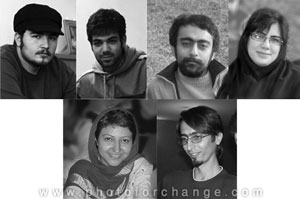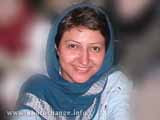Jelveh Javaheri of Iran and Aung San Suu Kyi of Burma have many differences at personal and political level. But, other than sharing the same biology, they have one thing in common, they both are prisoners of conscience by authoritarian states in countries where respect for human rights and human dignity is undermined and violated.
Aung San Suu Kyi, the acclaimed Burma leader and Nobel Peace Laureate in her famous speech “ All we want is our freedom” in 2003 said “As I travel through my country, people often ask me how it feels to have been imprisoned in my home —first for six years, then for 19 months. How could I stand the separation from family and friends? It is ironic, I say, that in an authoritarian state it is only the prisoner of conscience who is genuinely free. Yes, we have given up our right to a normal life. But we have stayed true to that most precious part of our humanity—our conscience.”
Aung San Suu Kyi was confined to a dilapidated house for 13 of the last 19 years, the woman known to the Burmese as ’the lady’ remains their prime minister-elect. She has been detained under house arrest by the country’s military regime under article ten of the 1975 state protection act, which permits the government to imprison anyone for up to five years. With her latest term of house arrest due to expire tomorrow, the Nobel peace prize laureate faces five years in prison over politically-motivated charges that she breached the terms of her detention. She is a prisoner of conscience.
Jelveh Javaheri, the young, vibrant and inspiring women activist in Iran like Aung San Suu Kyi has given up a “normal life” to stay true to her conscience and strive to change the discriminatory laws against women and girls in Iran. She, like thousands of Iranian women and men, demand what belongs to her and other women as human beings which is rights and dignity. She is also in detention and a prisoner of conscience.

Change for Equality, on May 2nd reported that six members of One Million Signatures Campaign, the campaign to change the discriminatory laws, were arrested during and after a peaceful demonstration which was held to celebrate May 1st. The police forces attacked the demonstrators even before they congregated and left many of the people with bloody faces.
There were more than 150 arrested and among them was Campaign activist Kaveh Mozafari, Jelveh’s husband. Jelveh was home when the intelligence forces raided their residence taking everything that potentially might have been useful to fabricate a case for pressing a charge against them including unthinkable and random items such as , Jelveh and Kaveh’s University degrees!!

They asked Jelveh Javaheri to go with them for questioning at the local office. Jelveh, being arrested before knew her rights and asked for a court order but there was no legal document ordering her arrest. With the use of force, three security guards arrested Jelveh while her mother who was witnessing the scene, yelled at the guards, “ You are putting handcuffs on the hands of freedom”. The Security Branch of the Revolutionary Courts charged her with actions against national security and collusion with the intent to participate in a protest, and disruption of public order. According to reports by Jelveh herself, she objected to these charges and explained that she was arrested in her home and had not participated in any protest. After conducting investigations officials realized their mistake. No new charges have been brought against her since she was not even at the protest.
Many of the workers, students and all Campaign activist who were arrested on May 1st peaceful gathering, are released but Jelveh and her husband remain in detention. A wide range of human rights, labor activists and women’s rights groups and websites including but not limited to Change for Equality, Kanoon Zanan, and Feminist School condemned the brutal and violent suppression of May Day peaceful gathering and demanded an end to the illegal detention of Jelveh Javaheri, a founding member of the One Million Signatures Campaign and women’s rights defender and Kaveh Mozafari, also a women’s rights defender and a Campaign member.
Of all the women who were arrested on May 1st, Jelveh is the only woman who is still in detention. In a recent interview of Radio Zamaneh with Jelveh’s mother who witnessed her arrest, she said “My daughter was dragged out barefoot and taken away as part of her husband’s property! There is no other reason for her arrest and on-going detention”.
The Irony of the May Day encounter with protesters lies in the fact that the Iranian government which has a tall records of human rights violations, claims to be the government of “ Mostazafin ”, the government of poor, oppressed and economically marginalized people, the government of the toiling masses. The statesmen of Iran shake hands with leaders like Chaves, allow posters of Che Guevara to be distributed and Che’s mural be painted on the public walls while crashing May Day celebrations and signing economic treaties with global economic powers that compromises the best interest of Iranian people. They claim to be at the front line of struggle against “Big Satan and Global Estekbar” (loosely means global arrogance) and question human rights violations in Iraq and Guantanamo, yet violating the rights of people to freedom of speech and assembly, inflicting violence on a peaceful gathering on the International Worker’s Day and detain rights activists illegally and on unfounded charges or even without any charges. This is Turbo Hypocrisy!
The realities of our world and complexities that the intersection of global patterns such as globalization, militarization and the rise of religious fundamentalism present, charge all progressive people, women rights defenders, social justice activists and human rights organizations and communities to set their minds free of the old paradigms and look at the world with a lens sensitive to gender, race, economic and social stratifications. As Audre Lorde said “There is no such thing as a single-issue struggle because we do not live single-issue lives.” The global struggle of conscientious people for rights, dignity, democracy and justice are all part of the fabric of humanity that women like Jelveh Javaheri and Aung San Suu Kyi are standing firm to defend. They inspire all of us to be true to the most precious part of our humanity—our conscience.
Open letter to Shahrudi: http://www.campaignforequality.info...
An eye witness account: http://www.irwomen.info/spip.php?ar...







